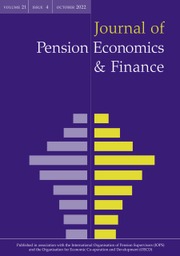Article contents
Voluntary savings, financial behavior, and pension finance literacy: evidence from Chile*
Published online by Cambridge University Press: 25 February 2013
Abstract
Chileans have limited knowledge of the pension system, its rules, and the consequences involved in their personal decisions within it. Using a variation in the household composition – having a pensioner in the household – as an instrument, we show that Chileans with greater knowledge about the pension system are more likely to have additional financial savings, but not within the voluntary pension saving plans offered by the pension system. We find that getting one additional answer right in the pension literacy survey (out of six) generates approximately a 50% additional chance that the individual will save at least in one of the surveyed periods, and a 25% additional chance that the individual will save in both surveyed periods. We also test for evidence that pension literacy affects worker choices regarding their pension savings (what we call active financial behavior). We find that more literate workers are more likely to engage in pension fund type switching and that independent workers are more likely to voluntarily enter the pension system as affiliates if they have greater pension finance literacy. Getting one additional answer right in the pension literacy survey (out of six) increases the probability of pension fund type switching by 20% and the probability of voluntary affiliation to the pension system of self-employed workers by 30%.
- Type
- Articles
- Information
- Copyright
- Copyright © Cambridge University Press 2013
Footnotes
The authors would like to thank Claudia Sahm, Patricia Medrano, Esteban Puentes, Jose Luis Ruiz, two anonymous referees and seminar participants at University of Michigan, University of Chile, the Chilean Public Policy Society, and the Chilean Economic Society for helpful comments. We thank Barbara Flores and particularly Federico Huneeus for excellent research assistance. This study uses information from the 2004 and 2006 Social Security Survey in Chile. The authors are indebted to the Office of the Deputy Secretary of Social Security of Chile for providing access to its database. All results of this study are the sole responsibility of the authors and the Office of the Deputy Secretary of Social Security of Chile disclaims all liabilities.
References
- 39
- Cited by


